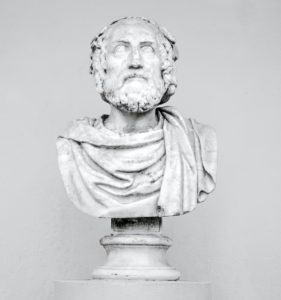I rarely ponder philosophical questions. They take me back to the merry-go-round of my childhood playground. We’d get the wheel spinning so fast that I’d hold on with a death grip to keep from flying off and bouncing across the hardpacked dirt.

In college I took the required Philosophy 101. It was one of my top five least favorite classes. I couldn’t wrap my brain around questions like What are thoughts and where do they come from? or Do numbers really exist or are they something man has created? or Why do women open their mouths when they put on mascara?

Occasionally, though, I do end up on that ride that goes nowhere. That was the case recently when my mind encountered the idea of existence. What if I had not been born? What would it be like if I had never lived? The alternative, of course, would be that I never existed. Ever. I wouldn’t know anything. But that would be okay, I thought, because . . . well, I wouldn’t even know I didn’t know anything. By now, the wheel was spinning furiously while my neurons were off swinging on the monkey bars instead of communicating with their neighbors.
The reality is that I do exist, and it can’t be undone. So here I am. I didn’t ask to be here, and no one asked me if I wanted to be here. That realization can be frightening. It was for me when the idea barged into my mind during one of my sleepless spells. Some thoughts can weigh awfully heavy in the darkness of night, and this one felt like Mount Rushmore had just been lowered onto my chest. I could barely breathe. I felt trapped and helpless.

I knew this fear was not from God because “There is no fear in love. But perfect love drives out fear” (1 John 4:18). However, I was grateful for that terrifying experience because I think God was letting me feel what many people do when they are thrust into a world they didn’t ask for, realize they have no control over being here, and don’t have any answers. It can be unbearable.
After God drove out my fear, the ride continued. Since I am here and can’t change the fact of my existence, I naturally asked Why am I here? That may be the question all philosophers try to answer, but I don’t remember any conclusive findings in my college textbook. Because I know God created me, He is the logical one to ask.
I ran through some scriptures I had memorized and found the answer to my existence in the words of God spoken through His prophet Isaiah:
6Bring my sons from afar
and my daughters from the ends of the earth—
7everyone who is called by my name,
whom I created for my glory,
whom I formed and made. (Isaiah 43:6-7)
God created me for His glory. It is wonderful to know why I’m here. But what exactly is His glory?
The Hebrew word is kabowd and means “honour, reverence, glory, as due to one or ascribed to one” (Brown-Driver-Briggs). In this case, it is honor due to God. Kabowd comes from the root kabad or kabed, which means “to be heavy, weighty, or burdensome.” It can be used in either a bad or good sense. Here it is good and has the idea of splendor or abundance (Strong’s Exhaustive Concordance).
You may wonder how we get from weighty to splendor. In the article “Words of Life (#4) Revealing the Glory—Kabod,” Dr. Jim McClure explains the development of the Hebrew word. The root kabed was also used for the liver, the heaviest of our internal organs. Then it came to mean wealth, as in ‘heavy with riches.’ It developed further to mean non-material wealth such as honor and splendor. Then glory became a characteristic of God.
McClure wrote “to encounter the glory of God is to encounter God himself.” This is seen in Ezekiel’s words: 22The hand of the Lord was upon me there, and he said to me, “Get up and go out to the plain, and there I will speak to you.” 23So I got up and went out to the plain. And the glory of the Lord was standing there, like the glory I had seen by the Kebar River, and I fell facedown (Ezekiel 3:22-23).
The Greek word in the New Testament that corresponds with the Hebrew word for glory provides further understanding. Doxa is used to indicate “an especially divine quality, the unspoken manifestation of God, splendor” (Strong’s Concordance). “Both terms convey God’s infinite, intrinsic worth (substance, essence)” (HELPS Word-studies). God’s glory is what makes Him God and different from everyone else. It’s His nature. It’s who He is.
What does it mean, then, that we are created for His glory? From the definitions for glory, we see that we are created to honor Him and that He wants to show His splendor to the world through us. David said to the Lord,
4What is man that you are mindful of him,
the son of man that you care for him?
5You made him a little lower than the heavenly beings
and crowned him with glory and honor. (Psalm 8:4-5)
God crowned man with His glory. He “created man in his own image” (Genesis 1:27). His intention was to be recognized in us. When people looked at us, they would see our Creator. And He was recognized in Adam until his disobedience. But since then “all have sinned and fall short of the glory of God” (Romans 3:23). Paul said a veil now covers our hearts. “16But whenever anyone turns to the Lord, the veil is taken away . . . 18And we, who with unveiled faces all reflect the Lord’s glory, are being transformed into his likeness with ever-increasing glory, which comes from the Lord, who is the Spirit” (2 Corinthians 3:16, 18).
When we become believers, we begin to display God’s glory, showing the world what God looks like and, thus, fulfilling our purpose for existing. The more closely we walk with Him, the more of His glory we will reflect.
It’s okay that we aren’t in control. We were never meant to be. Life doesn’t work well unless God, the Creator, is the One in charge. And when He is, the wildly spinning merry-go-round of grasping for purpose is transformed into a joyous carousel ride of reflecting the glory of God.

Scripture quotations are from NIV.
Hebrew and Greek definitions and commentary notes are from Bible Hub. See Resources.
Feature photo by Rene Cerney on FreeImages




Brenda Murphy
May 15, 2021That’s really good Bonnie. I love being reminded that we’re here to reflect His glory. What an amazing purpose!
bspencer
May 15, 2021Yes, and to realize that certainly changes our perspective on so many things. Thank you, Brenda.